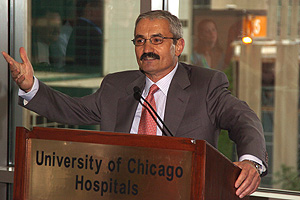![[Chronicle]](/images/sidebar_header_oct06.gif)
Vol. 26 No. 16
current issue
archive / search
contact
Past Opine interviews:
Lauren Berlant
Stephen Berry
John Boyer
David Cohen
Jerry Coyne
John Cunningham
Richard Epstein
John Frederick
Henry Frisch
Austan Goolsbee
Bernard Harcourt
Greg Jackson
Martin Marty
Martha Nussbaum
Raymond Pierrehumbert
José Quintáns
Jan-Marino Ramirez
Saskia Sassen
William Sewell
Herman Sinaiko
Geoffrey Stone
Cass Sunstein
Simon Swordy
Opine: José Quintáns
 José Quintáns | |
This week, José Quintáns, the William Rainey Harper Professor in Pathology and the College, Master of the Biological Sciences Collegiate Division and Director of the Medical Scientist Training Program, answers the Chronicle Opine questions, which other faculty members have answered in past issues since October 2006, when Opine debuted.
What book should every person read and why?
Nick Lane’s Power, Sex and Suicide. It deals with the evolution of biological diversity, the complexity of individual organisms and how they grow, age and die. More importantly, it explains how mitochondria power the human soul. In other words, it explains why there is no poetry without ATP. This book inspired me to create the motto Crescat ATP cruribus cyclastarum for the University cycling team, which will be on display at the Monsters of the Midway Race on Sunday, May 13.
If you could meet any scholar, author, composer, musician or entrepreneur—dead or alive—who would it be and why?
I would have liked to have hung out with the 16th-century Spanish physician and theologian Miguel Serveto, the discoverer of pulmonary circulation. As a physician, he demonstrated that blood in the right ventricle could reach the left only via the lungs, not through the nonexistent galenic holes in the heart walls. As a theologian he managed to simultaneously offend Calvin and the Catholic Church; for this he was burned at the stake in Italy.
Among the complex moral and political issues that affect humanity, which do you believe will never be resolved and why?
My take on this query is similar to those of other luminaries who opined earlier: the equitable distribution of wealth and health care, particularly for the mentally ill, and educational opportunities for all. As an educator, I feel it is critical to spread scientific literacy throughout the world, particularly among Political Science majors.
If politicians had to pass an exam before they were allowed to serve in public office, what question would you add to the test?
Tests for politicians are not as important as the interpretation of their results by the electorate. So what is important is to have an educated citizenry that cannot be fooled easily. But since you asked for a test, I would administer to politicians the quiz I give College students taking Core biology. The test asks simple questions such as “What do the kidneys do?” or “What is the most abundant protein in the blood?” If a politician, like many of our students, answers that the kidneys “produce lymph,” and choose cholesterol as the most abundant protein in the blood, I would declare them unfit for public office, even if they own guns and hunt regularly.
If you could choose any three University professors and give them a one-year sabbatical together to solve a problem, develop a theory or make a discovery, who would they be and what task would you assign them?
I would like to ask three Physical Sciences Division colleagues to help me design a truly interdisciplinary science curriculum for undergraduates and high school students that reflects the seamless interdisciplinary research culture spreading throughout the Biological Sciences and the Physical Sciences divisions.
Think of a renowned scholar from the past who added great value to your area of study. What would this person think of the advances that recently have been made in this field?
I think of Niels Jerne who, in 1967, declared the end of immunology. In 1971, during my job interview in Basel, he warned me about “the” three things that were not important in immunology: macrophages, the complement system and Freund’s adjuvant. He died in 1994, right before the revolution in innate immunity, which has changed the field.
What building on campus do you think is the most interesting architecturally and why?
I agree with John Boyer and other opinion-makers that Harper Memorial Library is the most aesthetically pleasing building on campus.
Will a liberal arts education remain relevant to students in our increasingly technological society? Why or why not?
The relevance of liberal education lies in its fundamental immediate, proximal irrelevance and its far-reaching, tonic relevance. It aids in our quest to address life’s unanswerable questions, many of which are the result of technological advances. Thus, a more technological society benefits from a liberally educated citizenry, as long as such citizenry can afford tuition at liberal arts colleges. As an educator, what I cherish in the liberal arts approach is the disconnect between input and output, the quintessential lack of accountability that gives us the freedom to fulfill what Bellow would have called our “infinitizing” needs.
How will the next generation of scholars—today’s students—change your field in the decades to come?
To make predictions about the future of immunology for decades to come is foolish. I predict that the titanic evolutionary struggle between immunity and anti-immunity will not cease, and that psychoneuro-immunology will become a legitimate scientific discipline under the spell of Martha McClintock (the David Lee Shillinglaw Distinguished Service Professor in Psychology and the College). In the short term, I predict that Angelo Scanu has found Jerne’s elusive internal image in an anti-idiotype, and that Albert Bendelac will find a way to use NKT cells to cure allergies.